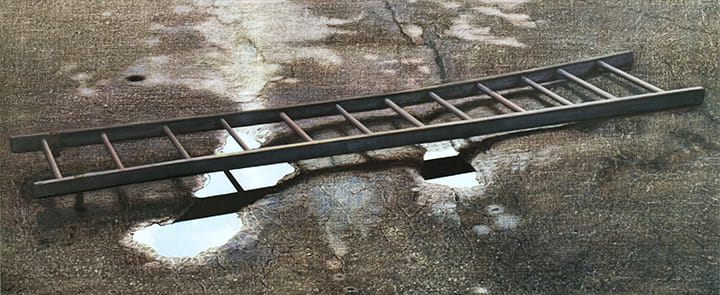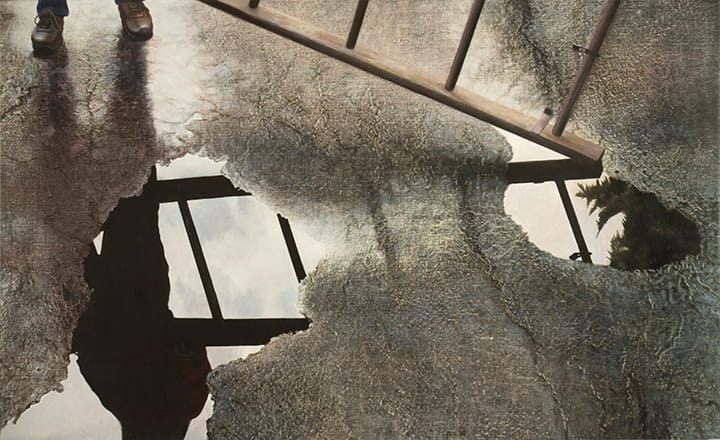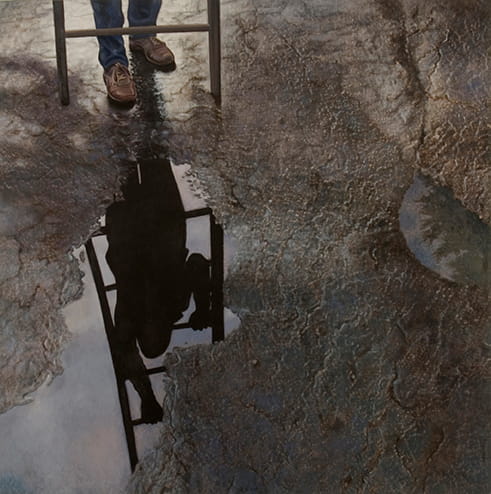March 16: Take Up That Ladder
♫ Music:
Day 20 - Monday, March 16
Rung #13: ON DESPONDENCY
Scripture: I Corinthians 2:1-5; Isaiah 41:10
And when I came to you, brethren, I did not come with superiority of speech or of wisdom, proclaiming to you the testimony of God. For I determined to know nothing among you except Jesus Christ, and Him crucified. I was with you in weakness and in fear and in much trembling, and my message and my preaching were not in persuasive words of wisdom, but in demonstration of the Spirit and of power, so that your faith would not rest on the wisdom of men, but on the power of God. [The Lord God says] do not fear, for I am with you; do not anxiously look about you, for I am your God. I will strengthen you, surely I will help you, Surely I will uphold you with My righteous right hand.
Poetry:
Blessing at the Burning Bush
by Jan Richardson
© Jan Richardson. janrichardson.com
You will have to decide
if you want this—
want the blessing
that comes to you
on an ordinary day
when you are minding
your own path,
bent on the task before you
that you have done
a hundred times,
a thousand.
You will have to choose
for yourself
whether you will attend
to the signs,
whether you will open your eyes
to the searing light, the heat,
whether you will open
your ears, your heart
to the voice
that knows your name,
that tells you this place
where you stand—
this ground so familiar
and therefore unregarded—
is, in fact,
holy.
You will have to discern
whether you have
defenses enough
to rebuff the call,
excuses sufficient
to withstand the pull
of what blazes before you;
whether you will
hide your face,
will turn away
back toward—
what, exactly?
No path from here
could ever be
ordinary again,
could ever become
unstrange to you
whose seeing
has been scorched
beyond all salving.
You will know your path
not by how it shines
before you
but by how it burns
within you,
leaving you whole
as you go from here
blazing with
your inarticulate,
your inescapable
yes.
TAKE UP THAT LADDER
It has been my collective experience in the Christian journey that the power of “fearfulness,” as a part of what we call “despondency” is grounded in receiving broken relationships which we cannot control as much as it is a threat to building healthy ones that we can embrace. Fearfulness is learned. It does not grow in a vacuum. Trust is fragile and for good reason. Violation encourages resistance to imagination and risk.
On the other hand, repair is almost always relational in nature. I am greatly encouraged by a clear biblical pattern of God reaching out to his people to try to overcome our natural predilection to run in fear from someone, clearly far more powerful and seemingly mysterious than ourselves. Life teaches us to expect power and force rather than empathy and respect. The Jews expected a warrior king. What they got was a self-sacrificing servant healer. How many times does God say “fear not” to someone who he wishes to work with on our level? (Moses, David, Gideon, Elijah, Mary, the disciples, the shepherds, etc. etc.) This is not the voice of condemnation, sophistry or self-aggrandizement but creative grace.
Paul clearly understands this in his approach to the fragile group of young believers in Corinth, when he had every opportunity to hide behind his vast rabbinical knowledge. Safety is needed for self-revelation and personal growth to occur, and it usually begins by being with people who are themselves unpretentious and authentically accessible. Similarly, God reaches out to his exiled people through Isaiah.
Today’s musician, Tara Ward, both in phrasing and tone, invites us into a place of reflection where it is safe to approach our God with requests for help, and questioning, because he is not only not threatened by it, but rather is eager to suspend our disbelief, and invite trust.
Jan Richardson, our poet today takes us further down the road where we are asked by Him to consider a calling to a task for ourselves, that exceeds anything we would consider reasonable. She clearly implies that one person’s “burning bush”, might be something far more ordinary and mundane for another, and that recognition of a “searing light and heat” in ground totally “familiar”, still is a call to dialogue, and a response to that voice, “that knows your name”. These are exquisite relational metaphors in the hands of gifted artists.
Joel Sheeley’s three paintings, brilliantly employ the slightly surrealistic imagery device of that “ground” and water reflection in a very clever way. This kind of compositional mapping captures the kind of fleeting moment that our poet and musician are referring to: a moment where an image is by reason of our position (where we are standing when we are watching our step to avoid a soaker), an encounter with a sign metaphor, a reflection that asks us rather than threaten us, to look up, and actually personally pick up that Bethel ladder (extended to us) and risk climbing with Him again.
Prayer:
Lord, grant us the courage to look again and eyes to see with.
Amen
James Tughan
Visual Artist and Educator
Executive Director of The Semaphore Fellowship
For more information about the artwork, music, poetry, and devotional writer selected for this day, we have provided resources under the “About” tab located next to the “Devotional” tab.
About the Art: (4 images)
All the Days
Joel Sheesley
2009
Oil on linen
24” x 80”
Morning at Bethel
2008
Oil on linen
32” x 80”
Angel of a Dream
2008
Oil on linen
45” x 75”
Messenger
2008
Oil on linen
48” x 48”
These paintings are a part of Joel Sheesley’s puddle paintings. These four selections progress from a scene of an open yet seemingly abandoned book next to a puddle, reflecting bare trees in a bleak environment, to a ladder waiting on the ground, lifted up, until it is finally position for a lone figure to take the first step to begin the ascent. The hyper-realism of Sheesley’s style captures the reality of a God for whom no detail goes unnoticed or uncared for. As James Watkins explains, “Sheeley’s devotion to his immediate environment is aimed at allowing that environment to be itself and to bring forth its meaning. He is committed to a world that is meaningful and that is sacramental in character. This sacramental understanding of reality is matched by a sacramental way of seeing. His puddle paintings, in particular, are excellent examples of a ‘sacramental way of seeing.’ Looking at these paintings, we peer down at the puddles in the cracked earth and at the same time see the reflection of the sky and trees above us. Sheesley combines ‘looking at’ and ‘looking beyond’ into a single action. As Sheesley observes: ‘because of the precedent of the Incarnation, people and objects in the visible world can be imbued with symbolic meaning.’” http://www.transpositions.co.uk/featured-artist-joel-sheesley/
About the Artist:
Joel Sheesley, Emeritus Professor of Art at Wheaton College in Wheaton, Illinois, is a painter whose highly realistic style combines with visual/spatial ambiguities to reveal the complex and coexisting layers of physical and spiritual “reality” as we know it. After receiving his BFA from Syracuse University and MFA from the University of Denver, he joined the art faculty of Wheaton College in 1974. Sheesley’s work embodies an ethic of love for his domestic and local environment. In an interview with art historian James Romaine, Sheesley says, “I’ve recently started to think that maybe all of my work for the last 20 years has been a kind of geographical study, that is a study of a locale, an environment, a place and a person in that place.” In that same interview he says, “my work is about trying to wrestle whatever kind of significance, beyond the material or naturalistic, that I can find in that reality.” His most recent work focuses on the landscape. In 2014-15, in conjunction with the Wheaton Park District, he painted exclusively on site in Wheaton’s Lincoln Marsh Natural Area. He has collaborated with The Conservation Foundation to raise awareness of the environmental importance of the Fox River and the Fox Valley. In 2017 the President's Art Commission at Wheaton College purchased fifteen of his paintings that span over thirty years of his career and will be installed in various locations on campus. They "illustrate his artistic journey, his connection to the area, and his commitment to integrate faith and practice.”
https://www.joelsheesley.com/
http://www.transpositions.co.uk/featured-artist-joel-sheesley/
About the Music:
“Do Not Be Afraid” from the album Hope for a Tree Cut Down
The Lyrics:
Do not be afraid to ask for what you need.
Do not be afraid to fall apart and free.
You just might get what you asked for
and you may find out who you are.
Jesus you are God.
You can do what you want
and you died for all of us.
I think it's crazy, but I'm starting to believe.
Do not be afraid to question your God.
He is not afraid. It's what he wants
for you to grow in knowledge of him,
for you to know that you can trust.
Jesus you are God.
You can do what you want
and you love me.
I think it's crazy, but I'm starting to believe.
About the Composer/Lyricist:
Singing and songwriting since the age of five, Tara Ward has a deep love for story-telling and writes music that illuminates the human condition. Ward studied vocal performance at Western Washington University in Bellingham, Washington. Her first solo album Credo was recorded a year after graduation and led to the formation of the band Late Tuesday with fellow collaborators Dana Little, Caitlin Evanson (currently touring with Taylor Swift) and Jocelyn Feil. Late Tuesday quickly became well-known for their tight harmonies and hook-laden melodies, touring and recording until 2007. After moving to Seattle, a conversation with Zadok Wartes (formerly of the band Mercir) started another project called “Urban Hymnal.” Ward, Wartes, and a couple other musicians - tired of the conventional models of “making it” in the music world - vowed to play their concerts in basements, never have an official band photo, and advertise only through word of mouth. Their first concert ended up being in the mammoth St. Mark’s Cathedral in Seattle to over 400 people. Urban Hymnal became “The Opiate Mass,” a Cathedral-Rock band taking cues from Handel’s Messiah to Explosions In The Sky. Tara led worship at the boldly innovative Church of the Beloved in Edmonds, WA, for over six years. This position allowed her to compose and arrange even more music and act as the producer for the four albums that have come out of that community. Tara also has a private voice studio where her unique blend of experience and compassion garners deep growth in her students.
https://tarawardmusic.com/bio/
About the Performers:
Tara Ward and the Church of the Beloved
The Church of the Beloved started as a group of friends sharing weekly meals and dreaming about ways to do church together. In those early days they read a book together called Life of the Beloved by Henri Nouwen. Ryan Marsh, Beloved’s “architect,” recalls that “after reading this incredible little book we all agreed that [Church of the Beloved] was to be our name, for this is who we are - 'Church' - called out of our isolation and into community. And we are 'Beloved' - deeply loved by God from all eternity.” The church eventually organized under the Evangelical Lutheran Church in America and also founded the Rosewood Community house, a community dedicated to living simply together, growing together in love for God and neighbor through rhythms of prayer, Gospel hospitality, and sustainable practices. The church was rich with incredible musicians and it soon became clear that they had much to share. Thanks to several donors, they eventually recorded four albums for free download, the first of which was Hope for a Tree Cut Down. Musicians featured on the album include Paula Best, Jason Best, Tara Ward (Beloved’s worship architect), Lacey Brown, and David Chapaitis. The closing service of Church of the Beloved and the Rosewood Community in Washington was on June 2, 2019.
About the Poet:
Jan Richardson is an artist, writer, and an ordained minister in the United Methodist Church. She serves as director of The Wellspring Studio, LLC, and has traveled widely as a retreat leader and conference speaker. Known for her distinctive intertwining of word and image, Jan’s work has attracted an international audience drawn to the welcoming and imaginative spaces that she creates in her books, online blogs, and public events. A native Floridian several generations over, Jan grew up in Evinston, a small community near the university town of Gainesville. The rural landscape, community traditions, and lifelong relationships fostered a rich sense of place, imagination, and ritual that continue to shape Jan's life and infuse her work. She often collaborated with her husband, the singer/songwriter Garrison Doles, until his sudden death in December 2013.
https://www.janrichardson.com/about
About the Devotion Writer:
James Tughan
Visual Artist and Educator
Executive Director of The Semaphore Fellowship
James Tughan, (B.Th., B.A. Hon., Fine Art), visual artist and educator, is also the Executive Director of The Semaphore Fellowship, a Christian arts advocacy group based in Oakville, Ontario, Canada. He currently is enrolled in the M.T.S. program at McMaster Divinity College, Hamilton, Ontario. He has served on the faculty of Redeemer University, Tyndale College and Seminary, and Sheridan University College. Tughan works in pastels and uses an adaptation of realism that he calls “Cartographic Realism,” a marriage of aerial visual mapping, natural symbolism, and a Christian theology. This style of imagery, he says, draws metaphors for the seen and unseen world of spirit from the natural surface topography of the visual subject matter itself. It exploits the details of surface patterning, texture, color, lighting, and narrative possibilities, and infers that there is more to see than what meets the eye. His work has been commissioned by major corporations throughout North America and magazines such as: Rolling Stone, Esquire, Saturday Night, and House & Garden.
http://jamestughan.blogspot.com/



